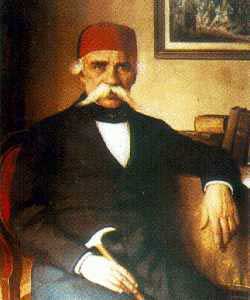- Vuk Stefanović Karadžić
Infobox Person
name = Vuk Stefanović Karadžić

image_size =
caption =
birth_date = birth date|1787|11|7|mf=y
birth_place =Tršić ,Serbia ,Ottoman Empire
death_date = death date and age|1864|2|7|1787|11|7|mf=y
death_place =Vienna ,Austrian Empire
occupation = Linguist
spouse =
parents =
children =Vuk Stefanović Karadžić (Serbian
Cyrillic : Вук Стефановић Караџић) (November 7 ,1787 -February 7 ,1864 ) was a Serbian linguist and major reformer of theSerbian language .Biography
Early life
Karadžić was born to parents Stefan and Jegda (maiden Zrnić) in the village of
Tršić , nearLoznica in Serbia, which was then still a part of theOttoman Empire . His family had a low infant survival rate and he was thus named Vuk ('wolf') so that witches and evil spirits would not hurt him. His family were members of theDrobnjaci tribe and moved to Tršić fromPetnjica ,Montenegro .Education
He was taught how to read and write by his cousin Jevta Savić, who was the only literate person in the region. He continued his education in Loznica, and later in the monastery of
Tronoša . Because he was not taught anything in the monastery, but was made to pasture the livestock instead, his father brought him back home. After unsuccessful attempts to enroll him in the gymnasium atSremski Karlovci , for which 19 year-old Karadžić was too old, Karadžić left for Petrinje where he spent a few months learning German. Later, he left forBelgrade , in order to meet his beloved Enlightenment scholarDositej Obradović , who rudely fended him awayFact|date=September 2008. Disappointed, Karadžić left forJadar and began working as a scribe forJakov Nenadović . After the opening of theVelika škola school in Belgrade, Karadžić becomes one of its first pupils.Later life and death
Soon after, he grew ill and left for medical treatment in Pest and
Novi Sad , but was unable to get treatment for his sick leg. Lame, Karadžić returned to Serbia, and after the unsuccessful rebellion in 1813 left forVienna where he metJernej Kopitar who helped him carry out his goals of reforming theSerbian language and its orthography. Due to conflicts withMiloš Obrenović I, Prince of Serbia , Karadžić was forbidden to publish books in Serbia and Austria, but managed to get help in Russia where he also received a full pension in 1826. His only surviving child was his daughter, Mina Karadžić. He died in Vienna. His bones were relocated to Belgrade in 1897 and buried with great honours next to the grave of Dositej Obradović.Work
Linguistic reforms
As one of the leading European philologists of his time, Karadžić reformed the Serbian literary language and standardized the
Serbian Cyrillic alphabet by following strict phonemic principles on the German model. Karadžić's reforms of the Serbian literary language modernized it and distanced it from Serbian and RussianChurch Slavonic , instead bringing it closer to common folk speech, specifically, to the dialect of EasternHerzegovina which he spoke. Karadžić was, together withĐuro Daničić , the main Serbian signatory to the Vienna Agreement of 1850 which, encouraged byAustria n authorities, laid the foundation for the Serbian language, various forms of which are used by Serbs inSerbia ,Montenegro ,Bosnia and Herzegovina andCroatia today. Karadžić also translated theNew Testament into Serbian, which was published in 1868.Literature
In addition to his linguistic reforms, Karadžić also made great contributions to folk literature, using peasant culture as the foundation. Because of his peasant upbringing, he closely associated with the oral literature of the peasants, compiling it to use in his collection of folk songs, tales, and proverbs. While Karadžić hardly considered peasant life romantic, he highly regarded it as an integral part of Serbian culture. He collected several volumes of folk prose and poetry, including a book of over 100 lyrical and epic songs learned as a child and written down from memory. He also published the first dictionary of vernacular Serbian. For his work he received little financial aid, at times living in poverty.
Major works
*Primer of the
Serbian language (1814)
*Dictionary of theSerbian language (1st ed. 1818, 2nd ed. 1852)
*New Testament (translation into Serbian) (1st partial ed.1824, 1st complete ed. 1847, 2nd ed. 1857)
*Serbian folk tales (1821, 1853, 1870 and more)
*Serbian folk poems, vol. 1 (1841)
*Serbian epic poetry (1845 and more)
*Deutsch-Serbisches Wörterbuch (German-Serbian Dictionary) 1872
*Biography of hajduk Veljko Petrović (Житије Хајдук-Вељка Петровића)Quotes
"Write as you speak and read as it is written." (The essence of modern Serbian spelling)
In Serbian: Пиши као што говориш и читај како је написано. ("Piši kao što govoriš i čitaj kako je napisano.")
Although the above quotation is usually attributed to Vuk Stefanović Karadžić, it is in fact an orthographic principle devised by the German grammarian and philologist
Johann Christoph Adelung . Karadžić merely used that principle to push through his language reform (as stated in the book "The Grammar of the Serbian Language " byLjubomir Popović ).The attribution of the quote to Karadžić is a common misconception in Serbia. Due to that fact, the entrance exam to the Faculty of
Philology of theUniversity of Belgrade (Serbia ) occasionally contains a question on the authorship of the quote (as a sort of trick question).Further reading
*cite book|last=Wilson|first=Duncan|title=The Life and Times of Vuk Stefanović Karadzić, 1787-1864; Literacy, Literature and National Independence in Serbia|location=Oxford|publisher=Clarendon Press|year=1970External links
* [http://www.antikvarne-knjige.com/biografije/vuk_karadzic/vuk_stefanovic_karadzic_biografija.html Biography] sr icon
* [http://www.bookrags.com/biography/vuk-stefanovic-karadzic/ Encyclopedia of World Bigraphy from Bookrags.com] en icon
*gutenberg author
*gutenberg-europe author|5579
* [http://www.vukova-zaduzbina.org.yu Vuk's Foundation] sr icon
* [http://www.rastko.org.yu/knjizevnost/vuk/index.html Vuk Karadžić online library] (atProject Rastko ) sr icon
Wikimedia Foundation. 2010.
